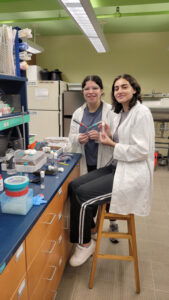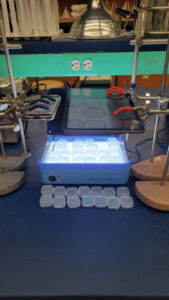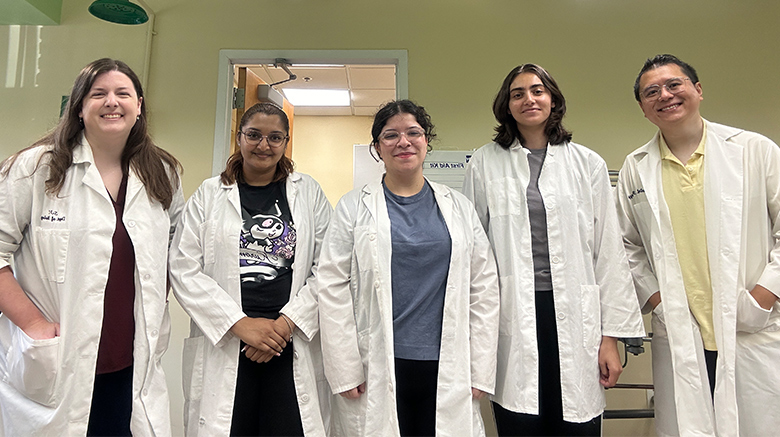Over the summer, St. Joseph’s University, New York students Anastajia Melika ’26 and Summer Undergraduate Research Fellowship (SURF) recipient Kaela Collazo ’25 partnered with Dr. Bor-Shuen Wang, examining how prenatal stress impacts behavior.
“My fascination with the ‘nature vs. nurture’ debate has been a driving force in my research career,” explained Dr. Wang, Ph.D., an assistant professor of biology at the Brooklyn Campus.
Dr. Wang’s research focused on how environmental factors shape the development of our visual systems. He was all set to continue this research at SJNY, but it was a conversation with fromer biology student Emily Burroughs that shifted his focus in what Dr. Wang describes as “a urprising and exciting direction.”
“Emily sparked my interest in the effects of prenatal stress on offspring,” he shared. “I was intrigued by the existing research showing that stress during pregnancy can influence the brain and behavior of children, potentially increasing the risk of conditions like autism, anxiety, and depression.”
Researching with Students at SJNY
 When bringing the idea of this research to his students, Dr. Wang was excited by their response.
When bringing the idea of this research to his students, Dr. Wang was excited by their response.
“What’s been truly rewarding is how this project, which started with Emily’s thesis research, has captured the interest of our students,” Dr. Wang said. “Their enthusiasm for exploring how stress impacts behavior has been inspiring. It’s amazing to see how student curiosity and passion can shape and drive research, and I’m excited to see where their interests will take us next!”
Melika researched the impact of prenatal circadian stress on anxiety and learning, while Collazo explored the biological mechanisms linking prenatal stress to anxiety-like behavior.
“My favorite part of the research was working with fruit flies and observing their behavior under the presence of stress or with no stress,” said Melika, a biology major minoring in religious studies and chemistry. “Fruit flies share many similarities with human physiology, so seeing how they behaved gave me insight into how humans may be affected under similar conditions.”
Collazo, a 19-year-old senior biology major with a minor in chemistry, shared that she enjoyed the brainstorming aspect of the research.
“These conversations between Dr. Wang, Anastajia and I made me realize how research and other professions require teamwork and collaboration,” the Queens resident said. “As an aspiring physician, teamwork is crucial when it comes to providing care to patients. Most importantly, there are times where things might not stick according to plan. And this is
okay! What matters is being able to critically think and communicate with your team. Research has allowed me to gain this skill.”
The Results
While the team finished their initial experiments, they’re still sorting through the data to collect their findings. So far, they’ve found:
1. Behavioral Observations: Collazo’s research indicates that the flies exposed to prenatal stress exhibit hyperactive behaviors. Specifically, these stressed flies travel greater distances and move at higher speeds compared to their non-stressed counterparts. These hyperactive traits resemble symptoms of ADHD in humans.
2. Learning Abilities: Interestingly, this research found no significant impact of prenatal stress on the flies’ ability to learn. The flies performed similarly in learning tests, regardless of their prenatal stress exposure.
3. Stress Resistance: Melika made an intriguing observation regarding the flies’ stress resistance. She found that prenatally stressed flies seem to have a lower tolerance to starvation, meaning they tend to die more easily when deprived of food. This suggests that while prenatal stress may not affect learning, it could reduce the flies’ overall resilience to stress. This observation is interesting, but it warrants further investigation to confirm and understand its implications.
“Overall, while the data confirms some behavioral effects of prenatal stress, particularly in terms of hyperactivity and anxiety, it does not appear to affect learning abilities,” Dr. Wang said. “The reduced stress resistance noted in our preliminary findings suggests an area for future research to explore in more detail.”
Future Plans for the Research
 Dr. Wang mentioned that he and the students do plan to continue their research and conduct more experiments, with hopes of discovering more.
Dr. Wang mentioned that he and the students do plan to continue their research and conduct more experiments, with hopes of discovering more.
“This research represents just the beginning of our exploration into the effects of prenatal stress on fruit fly behavior,” he said. “As we continue our research, we hope to unravel the complex interactions between prenatal stress and behavior, ultimately paving the way for potential interventions and deeper insights into stress-related disorders.”
Eventually Dr. Wang, Collazo and Melika hope to present their research at conferences and eventually get it published.
“The study of how prenatal stress affects subsequent generations in fruit flies is relatively rare, making our findings particularly noteworthy,” Dr. Wang said. “Given the unique advantages of using fruit flies and the sophisticated genetic tools available, we have a valuable opportunity to explore and uncover specific mechanisms underlying prenatal stress-induced behaviors like anxiety and hyperactivity.”
Publishing their research will not only allow them to contribute to the scientific understanding of how prenatal stress impacts behavior, but it will also allow them to highlight the possibilities in terms of using fruit flies to examine complex transgenerational effects.
“Overall, we believe that our research offers novel insights and could inspire additional studies in this field,” Dr. Wang said. “We’re excited to share our work and contribute to the growing body of knowledge on how early life stress impacts behavior across generations.”

